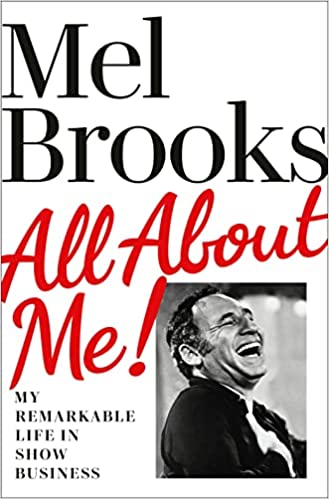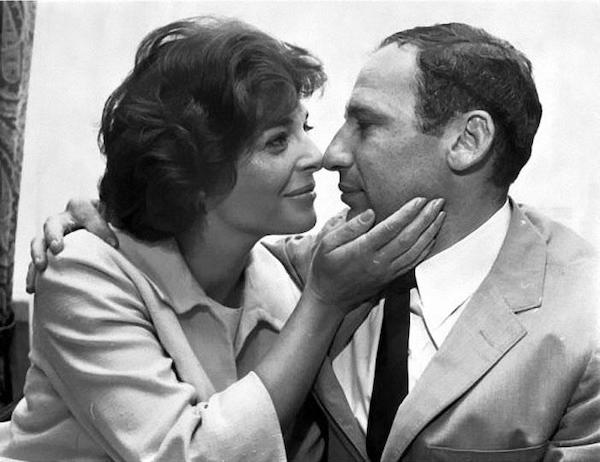Book Review: All About Mel Brooks — By Mel Brooks
By Tim Jackson
This is Mel Brooks’s warm and amusing love letter to his golden years in comedy.
All About Me! My Remarkable Life in Show Business by Mel Brooks. Ballantine Books, 480 pages, $23.90.

Given that he has spent 95 years in show business, Mel Brooks is a man of a thousand stories. Many of these yarns are collected in his latest book, All About Me!. The volume is essentially a compendium of rambling reminiscences, starting with his early days as a wisecracking kid who got a job as a busboy in the Borscht Belt. There he learned his comic craft. He was a natural. Early on Brooks remembers filling in at the last minute in a small role for a wounded actor. He came onstage in a wig, a fake goatee, and painted wrinkles and immediately proceeded to knock over a full glass of water. He walked to the footlights and confessed: “Sorry folks. I’m only 14. I’ve never done this before.” The audience went wild. This is the heart of Brooks’s comedy: get the laugh, anything goes, the world is absurd, smash the fourth wall.
And so it goes — All About Me! gives us a waggish grandpa retelling ancient tales. Brooks’s colorful anecdotes cover a lot of territory: there are comic gems, delightful memories of the old days, and educational advice for succeeding at seat-of-your-pants filmmaking.
Some of his best looking back is when he talks about the early days writing for his mentor Sid Caesar in the ’50s, part of a legendary group of comic writers that included Woody Allen, Neil Simon, Larry Gelbart, and Carl Reiner. At parties, with Reiner as straight man, they improvised the now famous Two Thousand Year Old Man routines. With the encouragement of George Burns and at the insistence of Steve Allen they recorded a few of those exchanges. The album became a hit that helped launch the rest of Brooks’s career.
The Producers, the first of the 11 films that he wrote or co-wrote, was not a hit until Peter Sellers accidentally screened it and was so blown away that he published a full-page letter in Variety saying it was “the essence of great comedy all in one film.” When the giant swastikas appeared on the stage of the “Springtime for Hitler” musical number, producer Joseph E. Levine demanded they be cut. “OK” he agreed. He left them in. “Lying to the studio at every turn” became a mantra.
Brooks gives full due to those who influenced and encouraged him, particularly his late wife, Anne Bancroft. When he was in a quandary about how to come up with the tune “Springtime for Hitler” she told him, “I know who could write it. You … You’re a born songwriter.” He did, of course, and 38 years later one of the 12 Tony Awards for the stage version of The Producers went to Brooks’s score.

Husband and wife: Anne Bancroft and Mel Brooks.
Fortune has treated Brooks well. Dustin Hoffman, initially cast for The Producers, had to bail out for a role in The Graduate (which coincidentally featured Bancroft). Gene Wilder took over the role. Brooks was handed the reins for The Producers after he had only shot a few commercials. The stellar casting of both Igor and the Monster in Young Frankenstein came about because Wilder’s manager, Mike Medavoy, asked if there could be parts for two other of his clients, Marty Feldman and Peter Boyle. Brooks dined with everyone from Jean-Luc Godard and Cary Grant to Mario Puzo and Joseph Heller — all fans. After nervously requesting a meeting with Alfred Hitchcock to discuss the parody High Anxiety, Brooks found that Hitchcock, too, was a fan. For a while he dined with him weekly (the meals the gourmand Hitchcock consumed are expanded upon in a Dick Cavett interview available on YouTube). After seeing the Brooks send-up, Hitch sent him a case of fine wine. Brooks recalls: “He said it was Nuit-Saint-Georges, a French pinot noir from a sub-region of Burgundy’s Cote de Nuits.” The accompanying note read: “What a splendid entertainment, one that should give you no anxieties of any kind.”
Waggish grandpas don’t bring up scandals or grudges. Brooks knows that he has been a very lucky man.There is no need to look back in anger. Reflecting on his films, Brooks notes that “it seems that in a lot of my movies there is a reoccurring philosophical dilemma about money versus love. I often have the characters decide love and friendship are better than riches.” This is a warm and amusing love letter to his golden years in comedy.
Tim Jackson was an assistant professor of Digital Film and Video for 20 years. His music career in Boston began in the 1970s and includes some 20 groups, recordings, national and international tours, and contributions to film soundtracks. He studied theater and English as an undergraduate, and has also worked helter skelter as an actor and member of SAG and AFTRA since the 1980s. He has directed three feature documentaries: Chaos and Order: Making American Theater about the American Repertory Theater; Radical Jesters, which profiles the practices of 11 interventionist artists and agit-prop performance groups; When Things Go Wrong: The Robin Lane Story, and the short film The American Gurner. He is a member of the Boston Society of Film Critics. You can read more of his work on his blog.
Tagged: All About Me! My Remarkable Life in Show Busines, Anne Bancroft, Carl Reiner, Mel Brooks


Thanks Tim. Have always admired Brooks’ movies and have found that for all the goofy on-the-nose bits, there’s a rogueish subversion at work that has aged well. Look forward to reading this.
I read this book .. laughed out loud!!! It is so much fun to read. I just loved it!